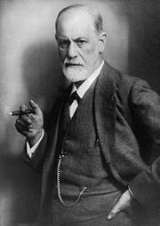
neurologist
who founded the discipline of psychoanalysis
. An early neurological researcher into cerebral palsy
, aphasia and microscopic neuroanatomy, Freud later developed theories about the unconscious mind
and the mechanism of repression
, and established the field of verbal psychotherapy by creating psychoanalysis, a clinical method for treating psychopathology
through dialogue between a patient (or "analysand") and a psychoanalyst.
Woe to you, my Princess, when I come... you shall see who is the stronger, a gentle girl who doesn't eat enough or a big wild man who has cocaine in his body.![]()
I do not doubt that it would be easier for fate to take away your suffering than it would for me. But you will see for yourself that much has been gained if we succeed in turning your hysterical misery into common unhappiness.![]()
Being entirely honest with oneself is a good exercise.![]()
I do not in the least underestimate bisexuality. . . I expect it to provide all further enlightenment.![]()
And now, the main thing! As far as I can see, my next work will be called "Human Bisexuality." It will go to the root of the problem and say the last word it may be granted to say — the last and the most profound.![]()
No one who, like me, conjures up the most evil of those half-tamed demons that inhabit the human beast, and seeks to wrestle with them, can expect to come through the struggle unscathed.![]()
Conscience is the internal perception of the rejection of a particular wish operating within us.![]()
At bottom God is nothing more than an exalted father.![]()
He that has eyes to see and ears to hear may convince himself that no mortal can keep a secret. If his lips are silent, he chatters with his fingertips; betrayal oozes out of him at every pore.![]()
The psychic development of the individual is a short repetition of the course of development of the race.![]()

